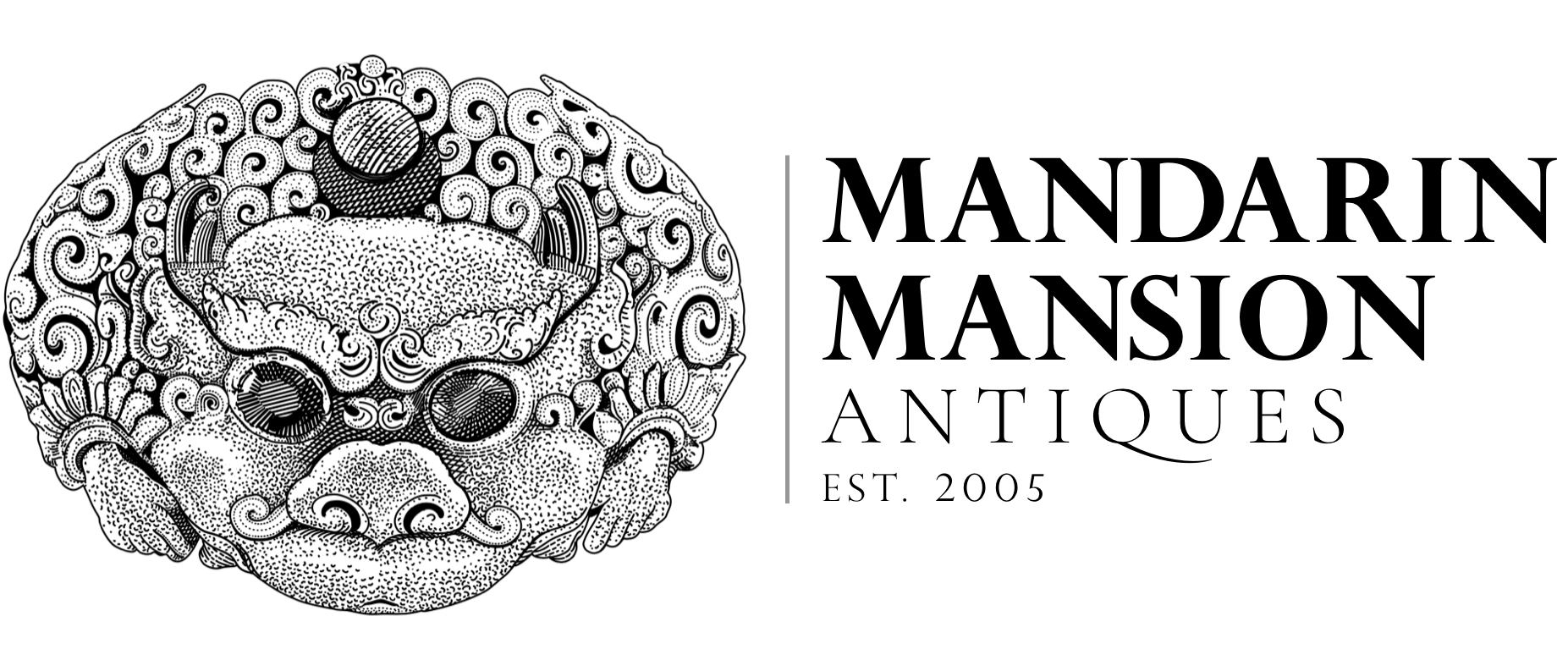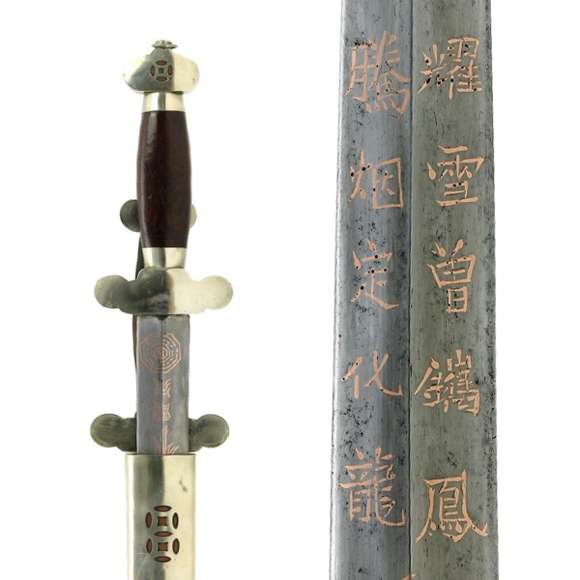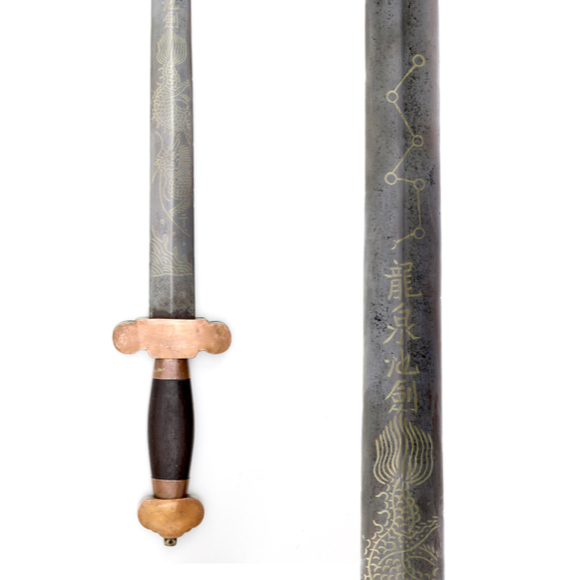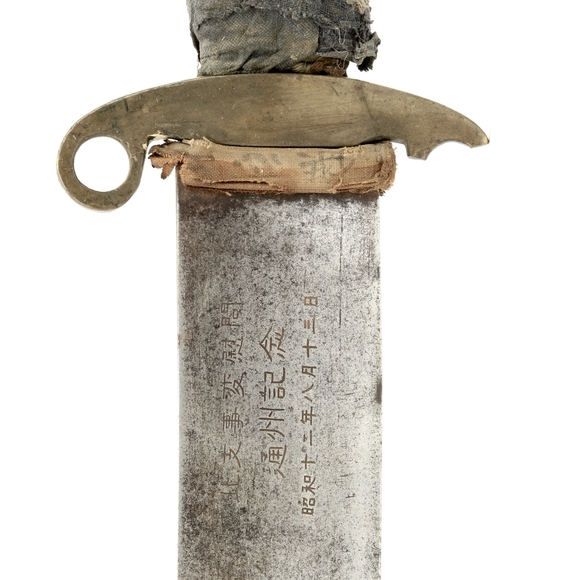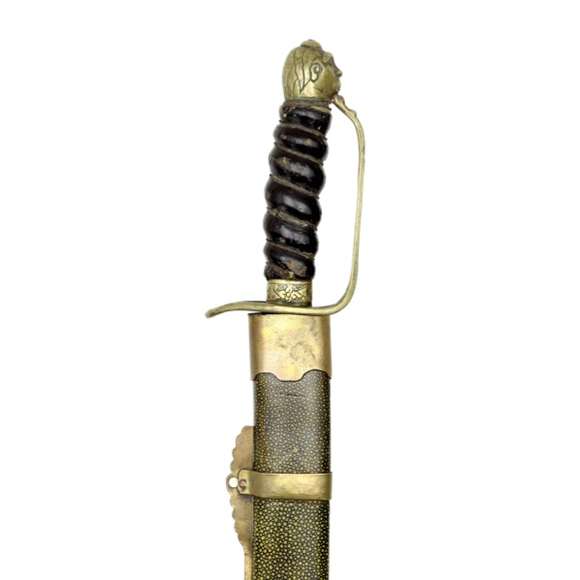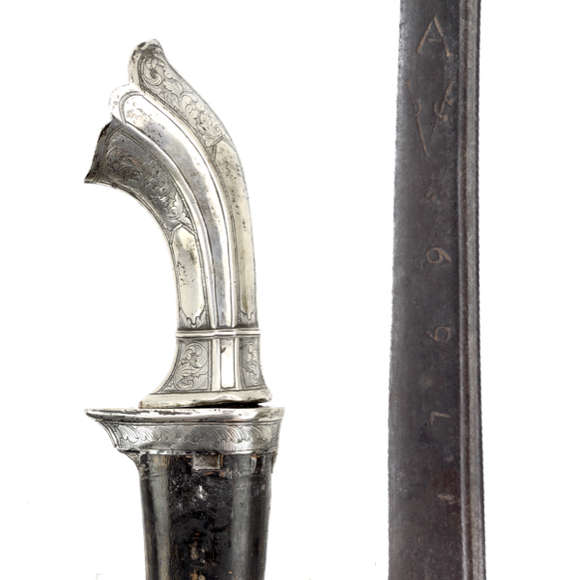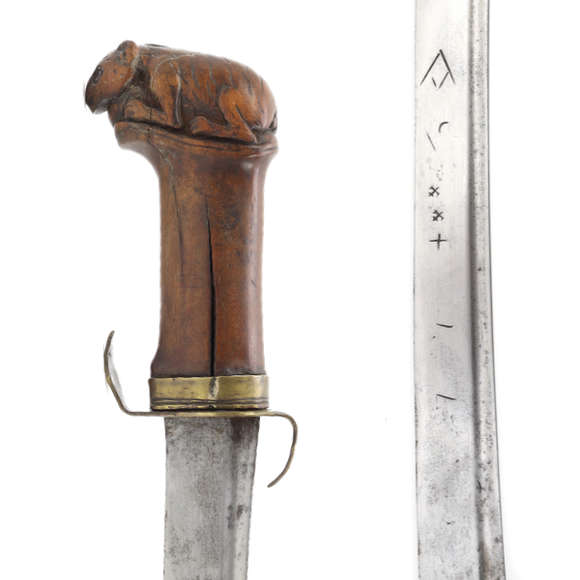Description
Lóngquán (龍泉) is a town along the Ou river in Zhejiang province, China, known for its sword making. Until the Tang dynasty, the town was called Lóngyuān (龍渊), yuān meaning a deep pool, or deep or profound in meaning. The founder of the Tang dynasty, Emperor Gaozu, banned the use of the character yuān as it was part of his personal name. Before this event, swords from lóngquán could also be called yuān jiàn (渊劍); "deep well sword".

An old set of double swords with an inscription that refers back to the town's past name.
Sold by Mandarin Mansion in 2021.
Right sword:
龍泉
Lóngquán
Left sword:
渊劍
Yuān jiàn
"Deep well sword"
Lóngquán marks on antique swords
The words 龍泉 can be found on many swords from the late Qing to early Republican period. They appear almost exclusively on straight swords, jiàn (劍). While some of them appear to be made in the town of Lóngquán, it seems that some others might be made elsewhere, especially in Canton.
The markings are usually found on one of the scabbard mounts, most often the upper suspension mount:
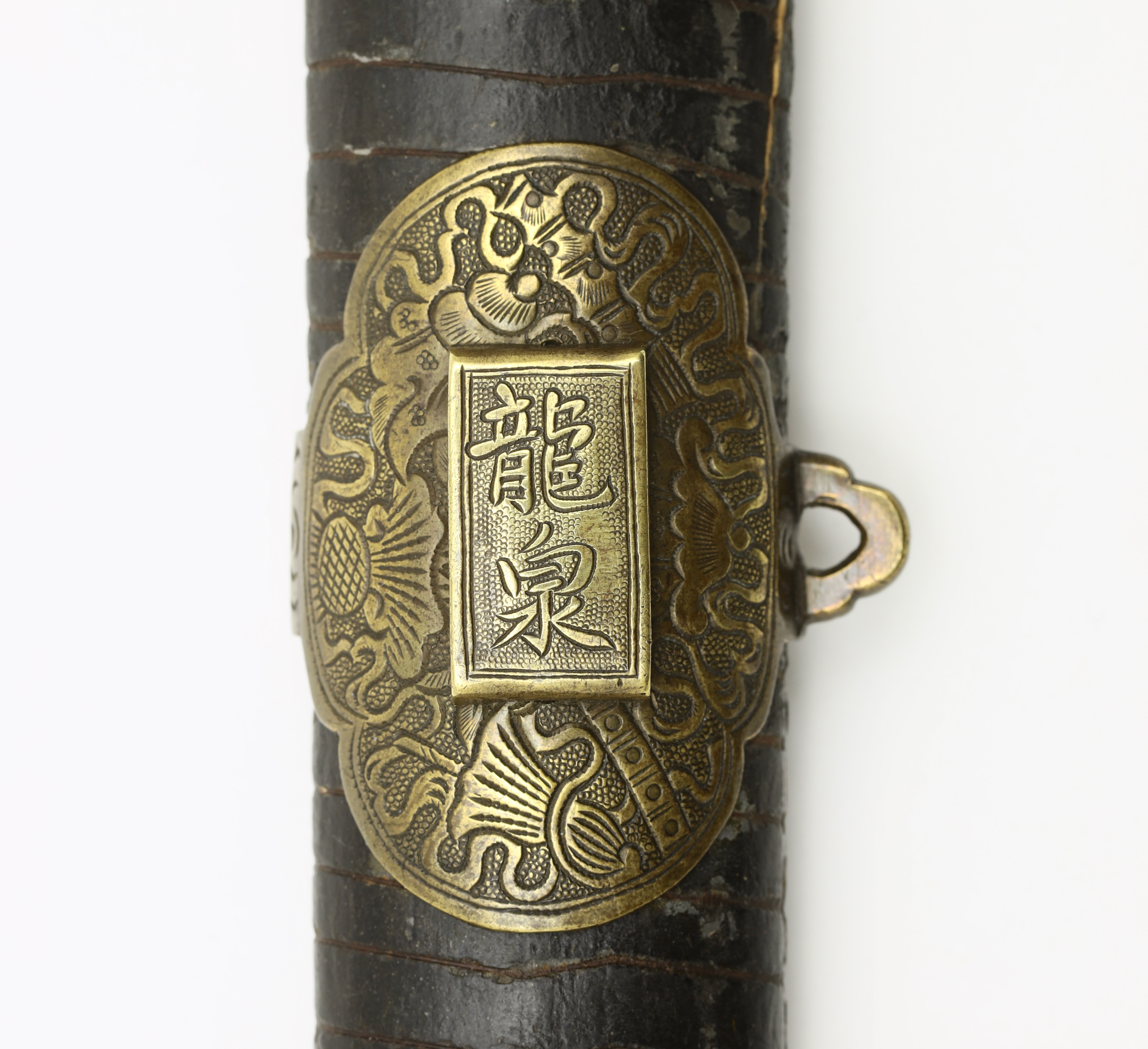
In rarer cases, the words are found inlaid into the blade in brass or copper. One such sword is published by Alex Huangfu.1 The markings include the words:
龍泉渊劍
Lóngquán yuān jiàn
"Lóngquán deep well sword"
千字号
Qiān Zì Hao
"Thousand Mark Brand"
A sword much like it was confiscated by the Japanese all the way up in Manchuria in the 1930s.2
Notes
1. See Alex Huangfu; Iron and Steel Swords of China. (皇甫江; 中国刀剑). Jinan, Tomorrow Publishing House, 2007. Page 225.
2. See the first image in an article by Ben Judkins; Through a Lens Darkly (24): Captured Chinese Swords and Traditional Weapons. Published online, 2014.
Known Lóngquán makers
A number of workshops are mentioned in Chinese sources. These were called jiàn pù (剑铺) or sword shops.
Qiān Zì Hao (千字号)
Founded 1748. Active to at least Guangxu period (1875-1908).
1748, the 13th year of Qianlong, blacksmith Zhèng Yì Shēng ((郑义生) opened the shop in Lóngquán East Street. He used a traditional method of guàn gāng (灌钢), combining molten pig iron and wrought iron to make swords. The method resulted in sharp swords that do not rust easily.
1830 (circa), Daoguang period, the Liào Tài Hé (廖太和) sword shop was known for skilled lòukè gōng (镂刻工), carving, in a decorative style of the Warring States period.
1858 (8th year of Xianfeng)
The Taiping Army was stationed in Lóngquán and needed a large number of swords and weapons. The fourth-generation grandson of Zhèng Yì Shēng, Zhèng Sāngǔ (郑三古)'s shop was overwhelmed by the surge in demand.
In the early Guangxu period (1875-1908), Zhōu Guóhuá (周国华), Zhōu Guóróng (周国荣) and Zhōu Guóguì (周国贵) submitted themselves as students to Zhèng Wénxuān (郑文轩) of the Qiān Zì Hao (千字号) sword shop with the son of Zhèng Sāngǔ as their teacher.
After graduation, Zhōu Guóhuá opened his own Wàn Zì Hao sword shop (万字号).1
Wàn Zì Hao (万字号)
Founded late 19th century.
Opened by Zhōu Guóhuá after completion of his training with Zhèng Sāngǔ of the Qiān Zì Hao shop.2
Chén Guǎng Lóng jiàn pù (沈广隆剑舖)
Active 1885-present
1st generation Chén Cháoqìng (沈朝庆)
2nd generation Chén Tíngzhāng (沈庭璋)
3rd generation Chén Huànzhōu (沈焕周)
4th generation Chén Xīnpéi (沈新培)
5th generation Chén Zhōu (沈州)
6th generation Chén Zhōngtiān (沈中天)
1885 (11th year of Guangxu)
1st generation Chén Cháoqìng (沈朝庆) starts making swords professionally in Lóngquán.
1894 (20th year of Guangxu)
2nd generation Chén Tíngzhāng (沈庭璋), son of Chén Cháoqìng founded the Chén Guǎng Lóng (沈广隆) sword shop at Xinhua street, Lóngquán.
1914
Governor Yang hosted the Lóngquán sword making contest, Chén Tíngzhāng won.
1915
Won the gold medal at the Panama–Pacific International Exposition, San Francisco.
1930
Won the best sword award at Nanjing Martial Arts Competition.
1942
Three sons of Chén Tíngzhāng, Chén Huànzhōu, Chén Huànwén, Chén Huànwǔ made a sword for Chiang Kai-shek.
1956
Chén Huànzhōu and Chén Huànwǔ made a sword for Mao Zedong.
1963
Chén Huànzhōu, Chén Huànwǔ, Chén Xīnpéi, Chén Wǔróng and four others established the Lóngquán Bǎojiàn Shēngchǎn Hézuòshè (龍泉寶劍生產合作社) or "Longquan Treasured Sword production cooperative".
1972
4th generation Chén Xīnpéi made a sword for US President Nixon.
1979
Received by chairman Deng Xiaoping for a group photo.
1983
The Chén Guǎng Lóng sword shop moved to a new location in dà shā (大沙).
1991
Chén Xīnpéi was officially recognized as a master of arts and crafts in Zhejiang Province.
2005
Xi Jinping visited the sword shop. Chén Xīnpéi and Chén Zhōu made a sword for him.
2007
Lóngquán sword making declared intangible cultural heritage. Chén Xīnpéi won a lifetime achievement award from the government later that year. 3
Notes to known sword shops
1. https://baike.sogou.com/v299709.htm
2. Ibid.
3. From sgljp.com. Thanks for KK Cheung from www.lkchensword.com.
